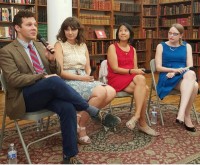
SMU’s Dallas Literary Festival Goes Virtual
prestonhollowpeople.com – Wednesday February 24, 2021

The theme of the Dallas Literary Festival, hosted by SMU, is a fitting one for the times — turbulence.
The free, virtual program will be from March 26-28. For the full schedule and to register, visit dallasliteraryfestival.org.
The event begins at 5:30 p.m. March 26, with Alice Johnson, author of After Life: My Journey from Incarceration to Freedom in a keynote conversation with Mitchell Jackson, author of Survival Math. March 27-28 will be devoted to panels, readings and author interviews featuring New York Times columnist and author of The Devil You Know: A Black Power Manifesto Charles M. Blow, the first Native American Poet Laureate of the U.S. and author of the memoir Crazy Brave Joy Harjo, Pulitzer Prize in poetry winner and author of Leadbelly and Olio Tyehimba Jess, the author of Where Reasons End and Must I Go Yiyun Li, and the author of the Pulitzer Prize-winning biography Sontag: Her Life and Work Ben Moser.

New Literary Agent Listing: Anne Tibbets
firstwriter.com – Wednesday February 24, 2021

Represents adult and young adult commercial genre, primarily thrillers, mysteries, science fiction, fantasy, horror, and historical women’s fiction.

Thanks to Undocupoets, poets don’t need papers to be heard
latimes.com – Tuesday February 23, 2021

Anyone can write a poem. To be a poet, though — to have your work read in an age not exactly teeming with famous verse stylists, Amanda Gorman aside — you have to submit. Every year, poets around the country submit their work for dozens of prizes and contests, hoping for a shot at prestige, visibility, maybe eventually an academic job offer. It’s a difficult path, and until recently it was an impossible one for poets like Javier Zamora.
Zamora earned his MFA in poetry in 2014 at New York University under the best writers in the country. He’d been published in literary journals like Narrative and Meridian (and would be in the New Republic and the New York Times). But in his early years, he was largely excluded from prizes, contests and fellowships.
The reason? His legal status. Zamora, 31, was born in El Salvador and had temporary protected status, but he was neither a citizen nor a permanent resident of the U.S. — a longtime requirement for award submissions.

Lit Agent Brooks Sherman Leaves Agency, Dropped by Authors
publishersweekly.com – Sunday February 21, 2021

Literary agent Brooks Sherman is no longer affiliated with Janklow & Nesbit Associates, where he has worked since 2017. He has also recently been dropped by a number of his clients, most prominently Angie Thomas, whose bestselling YA novel The Hate U Give has been added to school curricula around the country and was made into a film that grossed $35 million at the box office—and whose sale, at auction for a rumored six figures, cemented Sherman as a major player in the children's publishing world.
“We have parted ways,” Thomas told PW yesterday by telephone from her home in Jackson, Miss., confirming that the break took place within the past week. She declined to disclose why she parted ways with Sherman or who initiated the split, but Sherman told PW in an email that Thomas fired him, adding, “It was an honor to have an opportunity to work with her for the past five years.”

New Magazine Listing: Brush Talks
firstwriter.com – Friday February 19, 2021

A journal of creative nonfiction, photography, and poetry related to China. Articles can take many forms: general essays, travel essays, profiles, memoir, and narrative nonfiction. We seek submissions about places, people, history, culture, the arts, science and technology — anything related to China that is well written, creative, and true (we do not publish fiction). Rolling submissions, no fee. Please visit our website for more information and read the guidelines before submitting.

New Literary Agent Listing: Kathryn Willms
firstwriter.com – Tuesday February 16, 2021

Looking for non-fiction manuscripts with a unique point of view. As a generalist who simply likes “good books,” she’s open to a variety of genres and is, ultimately, a sucker for a good story compellingly told.

Why your favorite magazines are morphing into books
edition.cnn.com – Saturday February 13, 2021

Shopping in the pandemic often means buying supplies for working, cooking and exercising at home. But consumers are also looking for ways to pass the time, and for some, that means picking up a magazine while they're out and about.
Those who braved a drug store, supermarket or newsstand this past month may have seen in the magazine section copies of Better Homes & Gardens' "Secrets of Getting Organized," Delish's "Keto Comfort Foods" and Time's collector's edition on the Korean pop band, BTS.
But these are not traditional magazines. They are what some in the media industry call "bookazines" — a blend of books and magazines — and in recent years, they have become more crucial to publishers' success.

How to write a love poem
theconversation.com – Saturday February 13, 2021

For many, this year’s Valentine’s Day will be like no other. If you are spending the day apart from your loved ones, and don’t fancy the card selection at your local Tesco, writing a poem can be a more personal way to reach out and connect. Indeed, to paraphrase John Donne, “more than kisses, [poems] mingle souls”.
Here are some poems to take inspiration from, as well as some prompts to help you get that first line on the page.

Novelists are writing for TV more than ever. How it’s changing the industry
latimes.com – Saturday February 13, 2021

In 2013, Sheri Holman had just turned 47 and her life was falling apart.
Raised in Virginia by a struggling single mom, Holman had bootstrapped herself through college to earn a theater degree, then moved to New York City to pursue acting. When that plan proved unworkable, Holman took a series of temp jobs in publishing, eventually becoming an assistant to an influential literary agent.
Throughout the early 1990s, when book advances were soaring, Holman wrote her first novel, “A Stolen Tongue.” Published to raves in 1997, the book built an audience for her 2000 bestseller, “The Dress Lodger.” In 2003, Holman’s “The Mammoth Cheese” was a finalist for the Orange Prize. Secure in her work, she married a good guy with a real job. They bought a Victorian house in Brooklyn, had a daughter and then twin sons. Holman quit her job to write novels and mother full-time.
Slow-forward five years. One of Holman’s sons was battling cancer. Her marriage was over. Her third book was taking forever to complete. “Witches on the Road Tonight” was finally published in 2011, to disappointing sales, with the book advance money long gone.

Agents Kingsford and Campbell part ways
thebookseller.com – Friday February 12, 2021

The agency Kingsford Campbell is splitting up, after Julia Kingsford and Charlie Campbell decided to separate their activities after seven years of working together.
Kingsford will continue to represent her clients, as Julia Kingsford Ltd, while maintaining her involvement in The Good Literary Agency, which she co-founded with Nikesh Shukla in 2018, as well as her consultancy work for publishers, writers and production companies. She can be found at juliakingsford.com and julia@juliakingsford.com.
Get the free newsletter | Submit a news item or article | Get Writers' News for your website





